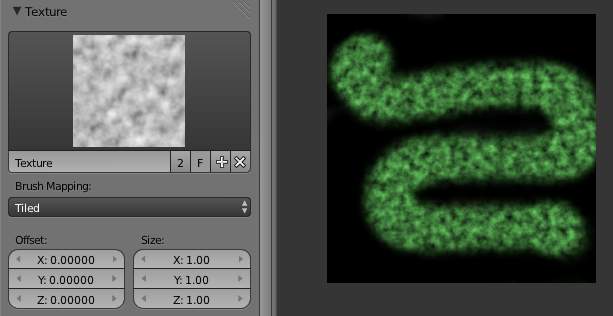Texture & Texture Mask¶
Texture¶
Use the texture data-block at the bottom of the paint panel to select a pre-loaded image or procedural texture to use as your brush pattern.
Note that in order to use it, you must have a placeholder material defined, and that particular texture defined using the Material and Texture buttons. It is not necessary to have that material or texture applied to any mesh anywhere; it must only be defined.
The example to the right shows the effects of painting with a flat (banded) wood texture. Switching the texture to Rings makes a target/flower type of brush painting pattern.
- Texture
- In paint modes the texture is used as a color source, while for sculpting it is used to determine the strength of the brush.
- Brush Mapping
Sets the way the texture is applied to the brush stroke.
- View Plane
- If View Plane is enabled, the current view angle is used to project the brush texture onto the model. I.e. the texture follows the mouse, so it appears that the texture is being dragged across the model. In 2D painting, the texture moves with the brush.
- Area Plane
- Projects the brush texture along the local surface normal, which keeps the texture from stretching when sculpting on a portion of the mesh that is at an extreme angle to the viewpoint.
- Tiled
- The Tile option tiles the texture across the screen, so moving the brush appears to move separately from the texture. The Tile option is most useful with tileable images, rather than procedural textures.
- 3D
- The 3D option allows the brush to take full advantage of procedural textures. This mode uses vertex coordinates rather than the brush location to determine what area of the texture to use.
- Random
- Picks a random texture coordinate to sample from for each dab.
- Stencil
Stencil mapping works by projecting the paint from the camera space on the mesh or canvas. Painting is applied only inside the boundaries of the stencil. The stencil is displayed as an screen space overlay on the viewport. To the transform the stencil texture and the stencil mask with additional
Altpressed:- Translate
RMB,Alt-RMB - Scale
Shift-RMB,Alt-Shift-RMB - Rotate
Ctrl-RMB,Alt-Ctrl-RMB
When using stencil scaling,
XandYare used to constrain the scaling to one axis. Pressing one of the buttons twice reverts to unconstrained scaling.- Image Aspect
- Restore the aspect ratio of the original image to reset stretching introduce by scaling, (image textures only). This operator can use the tiling and scale values of the brush texture if the relevant are enabled in Operator panel.
- Reset Transform
- Restores the position of the stencil.
- Translate
- Angle
Ctrl-F This is the rotation angle of the texture brush. It can be changed interactively via
Ctrl-Fin the 3D View. While in the interactive rotation you can enter a value numerically as well.- Rake
R - Angle follows the direction of the brush stroke. Not available with 3D textures. (shortcut sculpting only).
- Random
R Angle is randomized per dab.
- Random Angle
- Constraints the random deviation to a range.
- Rake
- Offset
- Offset the texture map placement in X, Y, and Z axes.
- Size
- Set the scale of the texture in each axis. Not available for Drag sculpting textures.
- Sample Bias
- Value added to texture samples (sculpting only).
Texture Mask¶
Brush strength is masked with a texture.
ToDo.
- Pressure Masking
A mask cut-off function. It allows to clip the mask result based on pressure, creating areas of no paint when low pressure is applied to the brush, similar to how a real brush would behave.
- Off
- Deactivated.
- Cutoff
- Simply selects between zero and one based on stylus pressure.
- Ramp
- Distributes the mask effect above the pressure value.
